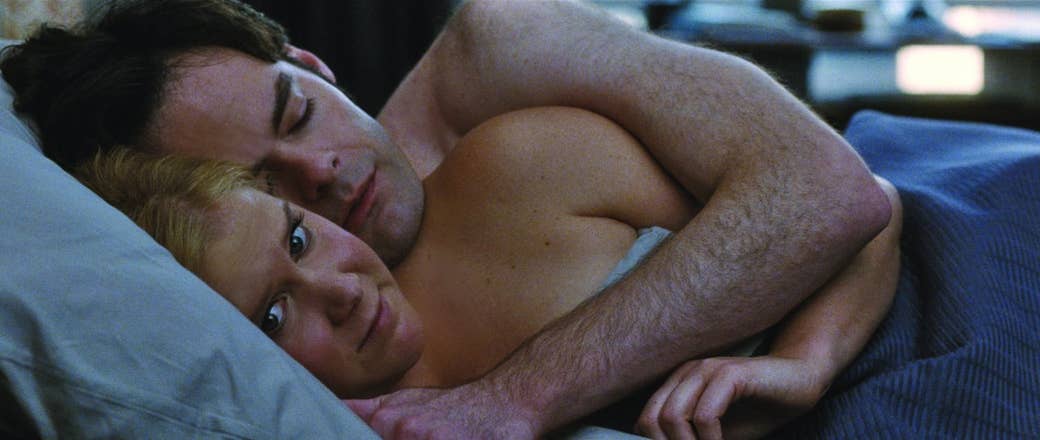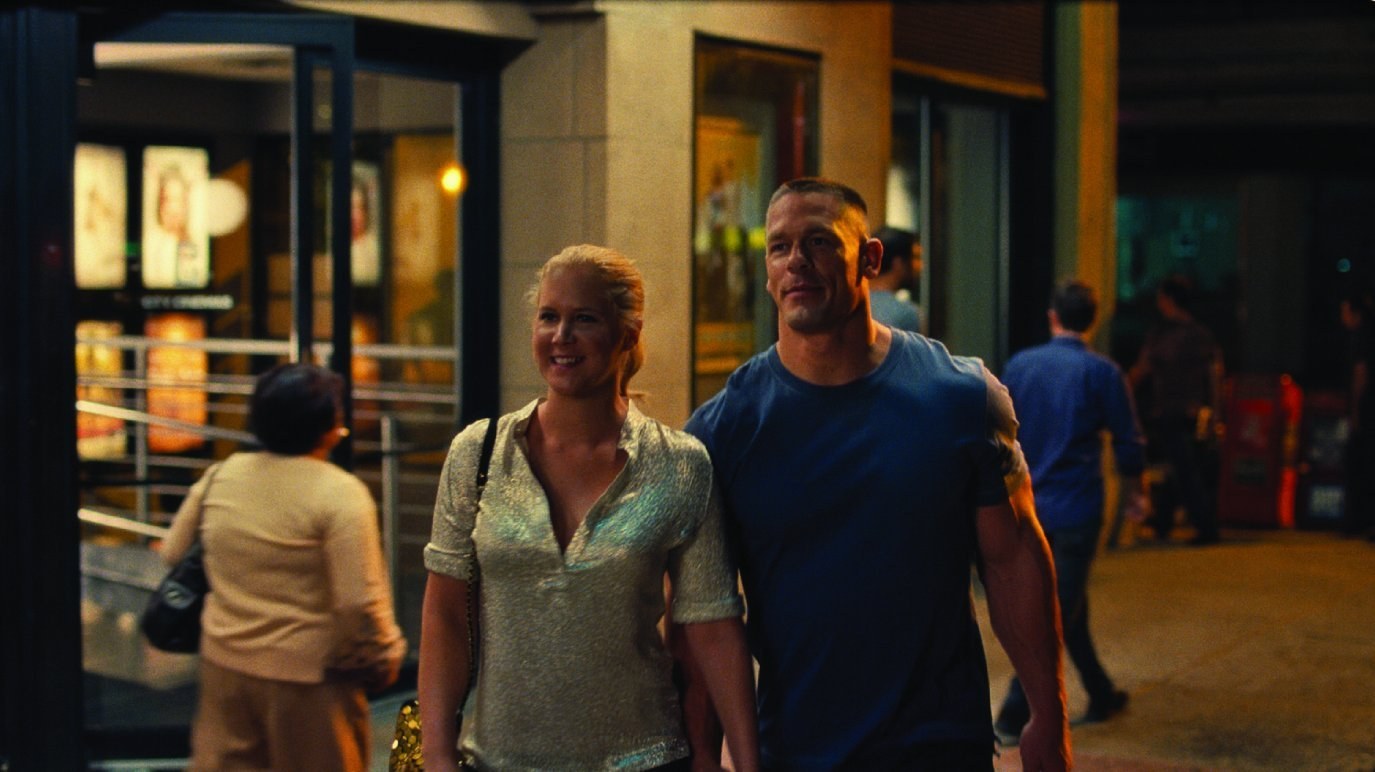
Within its shaggy embrace, the Judd Apatow comedy empire includes the female friendship saga Bridesmaids, the high school story Freaks and Geeks, Lena Dunham's Brooklyn bildungsroman Girls, and the biopic spoof Walk Hard: The Dewey Cox Story. But when it comes to the movies Apatow himself has directed, there have been two all-consuming themes — guys who struggle to grow up, and the women who domesticate them.
First there was Andy (Steve Carell), the title character of The 40-Year-Old Virgin, a man who, like the action figures he collects, is still in mint condition, frozen in a sort of extended adolescence until single mom Trish (Catherine Keener) comes along. Then there was Ben (Seth Rogen), the 23-year-old stoner hauled into respectability by the unexpected pregnancy that resulted from his one-night stand with type A Alison (Katherine Heigl).
There's also Funny People's famous comedian George (Adam Sandler), a cautionary tale for would-be protege Ira (Rogen again). After rattling around his mansion for years having sex with girls who "always leave disappointed," George tries to win back Laura (Leslie Mann), whom he loved but couldn't help cheating on. And by This Is 40, we got Pete (Paul Rudd), a dude who's married, with children, to Debbie (Mann again) and who's still wrestling with arrested development, eating cupcakes out of the trash and putting out doomed records by commercially unviable bands.

In Apatow's films, it's women who herd men into adulthood and attempt to keep them there. It's a service for which he seems sincerely appreciative, even as the stories he's telling are about how these relationships are pretty much the death of fun. That's the fundamental contradiction at the heart of Apatow's work, as hilarious, profane, tender, and annoying as it can be as a whole. His movies venerate monogamy in such a traditional configuration — the house, the kids, the manicured backyard — and yet, they're never as lively and comfortable as when they're depicting the ways in which guys can be slovenly goofballs letting it all hang out together. It's why This Is 40, the Apatow film that most turned away from male friendships in favor of married life, inadvertently made its characters' plush Los Angeles existence look like suburban No Exit.
It's been tough to conceptualize what a female-led Apatow comedy would look like, not just because it's hard to imagine a studio movie in which the female equivalent of Seth Rogen romances a male equivalent of Leslie Mann, but because it's Apatow's women who've always had to lead the charge toward a stable home life, responsibility, and growth.
So thank god for Amy Schumer, the writer and star of Trainwreck, who solves this problem, albeit imperfectly.
Trainwreck is still very much an Apatow movie about how a pot-smoking, foul-mouthed disaster of a main character finds happiness by coupling and cleaning up. But it doesn't feel like a gender-flipped version of a story Apatow's already told, about a guy who finds himself astonished and grateful to have earned the attentions of some endearing harridan.
Trainwreck, like Knocked Up and The 40-Year-Old Virgin before it, falls into the bawdy end of the romantic comedy genre, but it often feels less like a rom-com and more like the story of a woman who comes to terms with the idea that she's met someone she might actually want to have a relationship with — and it's terrifying. Aaron (Bill Hader), the dorky dreamboat doctor Amy (Schumer) meets when assigned to write a story about his work with professional sports teams, is on board pretty much from the start. One of the movie's most heart-melting moments comes early on and in defiance of usual rom-com contortions when Aaron tells Amy straightforwardly that he really likes her and thinks they should date. The transformation is entirely hers.

Amy is her own kind of hot mess, injecting a jolt of chaos into Apatow's world in which women are inevitably the grown-ups. She's already an adult, one with a nice New York apartment, a high-flying job as a writer at a pitch-perfect fictional men's mag called S'Nuff, and a muscly sorta boyfriend (John Cena, in one of the movie's several delightful comedic performances from unexpected parties) who doesn't know they aren't exclusive. And Amy likes to have sex, as we see from an introductory scene in which she maneuvers her way into receiving some oral sex, reaches orgasm, and pretends to fall asleep so she doesn't have to return the favor.
Amy has what one might call sex like a man, except that it's not the kind of sex that Apatow's male protagonists generally get to have. They tend to be the opposite of ladies' men, awkward or virginal or getting turned down by their wives because their wives are constipated. They tend to be like Aaron, who admits to having slept with three women in his life, as opposed to Amy, who struggles to come up with a number for the past year. Apatow is one of the kings of the R-rated comedy, but there's a conservatism to his treatment of sex and relationships that's tied up in his empathy for late blooming nice guys. And it's one that Schumer's subversive sensibilities nicely counter.
When Amy crawls out of a stranger's bed and realizes, to her dismay, that it's a bed in Staten Island, her ferry ride of shame is actually a scene of bedraggled joyousness, arms flung open king-of-the-world style (or queen). The title of the movie suggests its heroine is in need of repair, but the early sequences of her tottering home in high heels and sneaking outside during a date to get high defy condemnation. It's not Amy's fecklessness that's the problem, it's what happens when she's no longer having fun, when she meets someone she really likes and the boozy random hookups no longer feel like freedom.
In the flashback that starts the movie, young Amy is told by the philandering father (Colin Quinn) she adores that the reason her parents' marriage failed is because "monogamy isn't realistic," a lesson she internalizes after chanting it at his request. But adult Amy, with her cherubic face and physical fearlessness, is having too much unfeigned fun for that to come across as the kind of hangup it's meant to. When someone tells her she's "mean," we shrug it off as easily as she does — it's not mean to not surrender to other people's expectations.
Still, there's nothing in Trainwreck that's as daring as Schumer's sketch comedy series, which prioritizes boundary pushing in a way that the movie doesn't. It only wants a happy ending, and wide-eyed Aaron — who looks out of his depth from the moment Amy calmly takes him home, sits him on the couch, and initiates sex — turns out to be too genuinely nice of a guy to unsettle Amy in anything but good ways (particularly thanks to the advice of his friend LeBron James, who plays himself, and gives another of the movie's surprisingly wonderful comedic turns).

Trainwreck's most raw moments deal not in shock, but in emotional ugliness — in the all-too-resonant ways that Amy, as she starts to feel more vulnerable, picks fights with the people who love her, including both Aaron and her younger, married, pregnant sister Kim (Brie Larson). The movie provides a showcase for Schumer's dramatic side, which is as impressive as her sense of humor, even if her character's eventual confession that she doesn't understand why Aaron would want to be with someone like her is Trainwreck's most disappointing moment. It's one in which she and the schlubby menchildren who precede her in Apatow's movies suddenly have something unwanted in common — they all see themselves as having managed to date up.
But the last thing we want from Schumer is a crisis of confidence or to have her put in a position in which she has to be gratified to finally have a good guy in her life. Amy is gloriously fallible, but she doesn't need to be fixed — or rather, whatever changes she makes should come at her own volition. Trainwreck wobbles a bit in guiding its heroine toward her happily ever after, and in trying to figure out a way to have her move forward without condemning the person she was. It does eventually make its way there with the help of a bitingly funny scene of utter humiliation that emphasizes it's not the random sex and drinking that are the problem so much as the oblivion Amy's now using them to seek out.
It works because Amy's the kind of character who can bounce back from sexual mishaps far easier than emotional ones — it's rock bottom rather than punishment. Trainwreck is a rewarding, imperfect struggle between two comedic sensibilities, but it's helped by the way that Aaron, unlike the Apatow women, doesn't seem like a scold. Amy gets her man, or maybe he gets her, because the character's journey is about getting herself to a place where she wants and is able to commit to him without it feeling like a compromise. It's not a surrender — it's a triumph.
